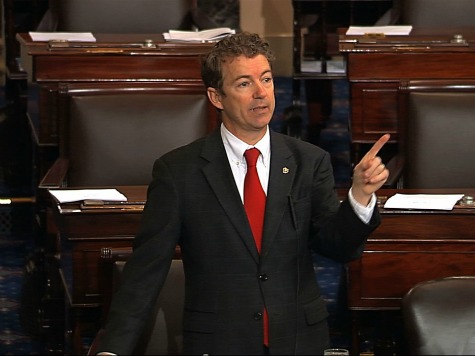Though Sen. Rand Paul (R-KY) never once mentioned the word “abortion” in his address at Liberty University last week — a speech that caused MSNBC’s Rachel Maddow to become apoplectic — the Associated Press, immediately targeted Paul’s speech as a crusade against abortion.
Because so many outlets use the AP as source material, myriad writers simply cribbed from the original AP story, without watching Paul’s speech or obtaining a transcript, focusing in on Paul’s abortion position. Despite their own complaints about Paul’s supposed plagiarism in a speech, the media made clear that its own work is often cribbed from different sources.
AP’s headline blared: “Rand Paul warns eugenics on horizon unless conservatives stand up against abortion rights.” That story was republished in papers like the Washington Post and other outlets, prompting papers such as the Lexington-Herald Leader to wrongly report that Paul spoke on abortion, which he did not. The publication has since issued a correction.
USA Today even edited a Courier-Journal story that did not have the word “abortion” in the lede and inserted “abortion” into the story that ran at USA Today. The USA Today lede read:
Kentucky’s Sen. Rand Paul warned a crowd at a religious college Monday that advances in biology combined with abortion could lead to a society that weeds out people deemed to have undesirable traits.
The Courier-Journal‘s lede was:
Kentucky Sen. Rand Paul on Monday warned a crowd at a religious college in Virginia that advances in biology could lead to a society that weeds out people deemed to have undesirable traits.
Speaking to 10,000 college students at the Liberty University arena, Paul spoke about the intersections of freedom and virtue, and how a free society requires virtue, especially in a world in which technology is advancing at a rapid clip. Paul spoke thoughtfully on his reflections about eugenics, emerging genetic technologies and advancements that will allow for manipulation and the search for human perfection. All of that was ignored by the media.
“Imagine a world in which disease and disability are eliminated: no meningitis, no Down’s Syndrome, no cleft palate, no cerebral palsy,” Paul said. “Man is able to select against these disabilities. Each individual’s biological future can be predicted by looking at their DNA.”
Paul told the Liberty University audience that scientists have mapped the Humane Genome and “scientific advancement is exploding.” He said he hoped “that leads to great progress in combatting disease,” but urged the audience to “keep an eye on who controls that technology.”
He asked the audience to imagine a world in which “your potential will be known simply by swabbing the inside of your cheek. No Down Syndrome. No Cerebral palsy.”
“It is easy to oppose eugenics at the hands of an omnipotent state. But will we have the strength of character to resist a world where eugenics is practiced voluntarily?” Paul asked. “Will we be sorry when we eliminate the disabled? Will we be sorry when we eliminate those with premature deafness such as Beethoven?”
He continued, asking, “Will we be sorry when we eliminate those with cerebral palsy, such as Christy Brown?”
Paul then proceeded to tell the story of Brown, who was “born with profound cerebral palsy” and only “had control of his left foot.”
“It was uncertain what mental capacity he had because he didn’t speak,” Paul said. “Doctors advised his parents to institutionalize him. His family was a big, loving family from Dublin and they chose to keep him at home. His brothers and sisters carted him around to their street games in a wheelbarrow.”
Paul recounted that when Brown was five, while lying on the kitchen floor, he reached out with his left foot. Picked up a piece of chalk and wrote the letter ‘A.'” The rest was history as Christy, Paul said, “went on to become an author and a poet. “
“Are we prepared to select out the imperfect among us? What will be the limits?” he asked the college audience. “Will we stop at disability? Will we go on to select for hair color, eye color, IQ, height, weight?”
In a lighthearted moment, Paul even joked that, “I hope we don’t do height, because I’m outta here, then.”
Paul emphasized, that as a doctor himself, he is not anti-science and hailed how science “offers us an amazing future,” and he noted that “in the past hundred years we have gone from 50 percent mortality in childhood to less than 1 percent.
“My hope, though, is that we don’t lose our appreciation of the miracle that springs forth from tiny strands of DNA,” Paul said. “Einstein said there are two ways we can look at the world: we can either look at life as if there are no miracles or look at life and see miracles everywhere.
“I choose the latter.”
The students who listened to Paul’s speech live and others who watched it online got a substantive discussion. Those who read the media coverage did not.

COMMENTS
Please let us know if you're having issues with commenting.